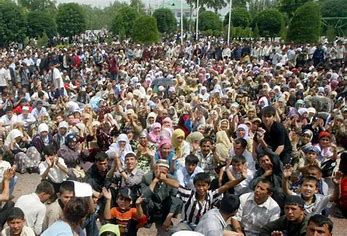Copenhagen: Globalization has an impact on national sovereignty and human rights, as the case of Pashtuns shows.
In an era where globalization has reshaped the dynamics of national sovereignty, the plight of marginalized communities, such as the Pashtuns in Pakistan, underscores the complex interplay between geopolitics, human rights, and state sovereignty. As nations strive to assert their autonomy in the face of global interconnectedness, the question arises: are human rights truly protected, especially for vulnerable populations living in conflict-ridden regions like the Pashtun belt?
CHALLENGES TO HUMAN RIGHTS: In every nation, the Constitution enshrines rights for its citizens. However, when lawmakers themselves flout these laws, as witnessed in Pakistan, the sanctity of human rights is jeopardized. Pashtuns, residing in a region historically marred by geopolitical tensions, face egregious violations of their basic rights. The imposition of extra-judicial killings by law enforcement agencies and the complicity of state actors in fostering terrorist organizations within their territory exemplify the systemic challenges to human rights faced by Pashtuns.
GEOPOLITICAL DYNAMICS AND PROXY WARFARE: The Pashtun region, straddling the Pakistan-Afghanistan border, has become a hotspot for proxy warfare due to its strategic significance. For decades, global powers have exploited this region to advance their geo-political agendas, exacerbating the suffering of Pashtun communities caught in the crossfire. The imposition of the Durand Line, a colonial-era boundary dividing Pashtun lands, further exacerbates tensions and fuels conflict, perpetuating a cycle of violence and instability.
WESTERN COMPLICITY AND HYPOCRISY: Despite rhetoric condemning terrorism, Western nations have often turned a blind eye to Pakistan’s role in perpetuating violence and instability in the Pashtun belt. Financial aid, military assistance, and diplomatic support provided to the Pakistani state have inadvertently bolstered state-sponsored terrorism, leading to further human rights abuses against Pashtun civilians. The moral hypocrisy of Western governments, who claim to champion human rights while tacitly supporting regimes implicated in atrocities, underscores the inherent contradictions of global politics.
QUESTIONING ACCOUNTABILITY: A crucial aspect often overlooked is the role of taxpayers in perpetuating these injustices. Citizens in Western democracies, particularly in Europe and America, contribute substantial funds to their governments through taxes. However, are they fully aware of how their taxpayer money is being utilized in international affairs? How much of their hard-earned money goes towards funding wars and conflicts in regions like the Pashtun belt, where human rights abuses are rampant and terrorism thrives?
CALL FOR TRANSPARENCY AND INTERNATIONAL RESPONSIBILITY: It is imperative that citizens demand transparency from their governments regarding the allocation of taxpayer funds in foreign policy initiatives. By holding elected officials accountable for their actions, citizens can ensure that their contributions do not inadvertently support human rights abuses and perpetuate cycles of violence in conflict zones. Only through informed engagement and collective action can we strive towards a more just and equitable world, where the rights of all individuals, including Pashtuns, are respected and upheld. Furthermore, the selective outrage exhibited by global institutions and media outlets in response to human rights abuses underscores the need for a more equitable and inclusive approach to humanitarian intervention.
The plight of Pashtuns in Pakistan serves as a stark reminder of the challenges posed by globalization to national sovereignty and human rights. As the world grapples with the complexities of interconnectedness, it is imperative that the voices of marginalized communities are not silenced in the pursuit of geopolitical interests. By questioning the accountability of our governments and advocating for transparency in foreign policy, we can work towards a future where human rights are upheld for all, irrespective of nationality or ethnicity.
Levsa Bayankhail, the General Secretary of the Pashtun Protection Movement in Denmark, Member of PTM EU committee on international advocacy and foreign affairs, is a writer and an advocate for human and women’s rights.

